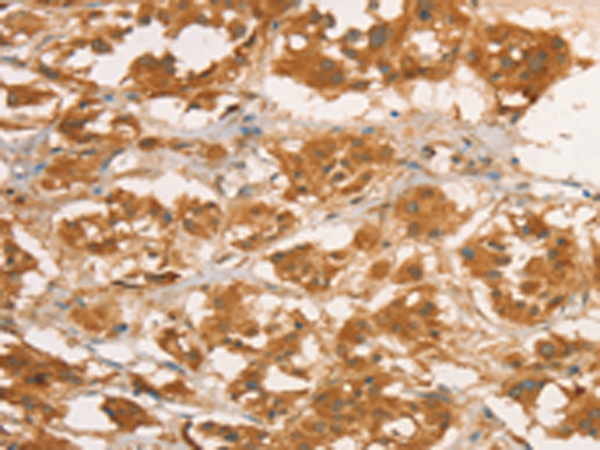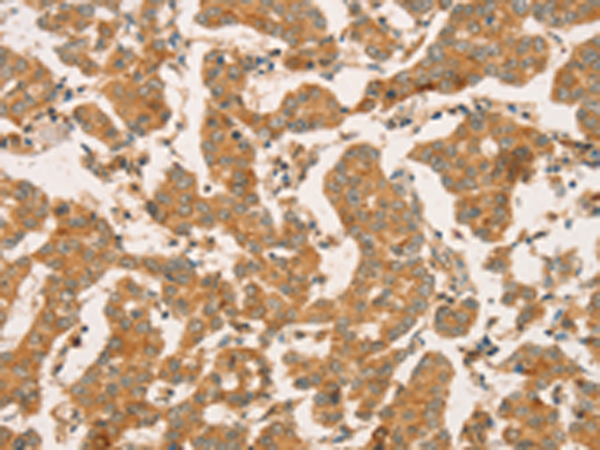

| WB | 咨询技术 | Human,Mouse,Rat |
| IF | 咨询技术 | Human,Mouse,Rat |
| IHC | 1/100-1/300 | Human,Mouse,Rat |
| ICC | 技术咨询 | Human,Mouse,Rat |
| FCM | 咨询技术 | Human,Mouse,Rat |
| Elisa | 1/2000-1/10000 | Human,Mouse,Rat |
| Aliases | CPB; PASP; PCPB |
| Host/Isotype | Rabbit IgG |
| Antibody Type | Primary antibody |
| Storage | Store at 4°C short term. Aliquot and store at -20°C long term. Avoid freeze/thaw cycles. |
| Species Reactivity | Human, Rat |
| Immunogen | Fusion protein of human CPB1 |
| Formulation | Purified antibody in PBS with 0.05% sodium azide and 50% glycerol. |
+ +
以下是关于CPB1抗体的模拟参考文献示例(内容为假设性描述,建议通过学术数据库核实具体文献):
---
1. **标题**:*Development of a Monoclonal Antibody Against Human Carboxypeptidase B1 (CPB1) for Pancreatic Cancer Biomarker Analysis*
**作者**:Smith A, et al.
**摘要**:研究团队开发了一种高特异性的抗人CPB1单克隆抗体,用于免疫组化(IHC)检测胰腺癌组织中的CPB1表达。结果显示,CPB1在肿瘤微环境中高表达,并与患者不良预后相关。
2. **标题**:*CPB1 as a Novel Inflammatory Marker: Validation of Polyclonal Antibody in Serum Detection*
**作者**:Johnson R, et al.
**摘要**:该研究验证了一种兔源多克隆抗CPB1抗体的特异性,通过ELISA和Western blot技术检测血清样本,发现CPB1水平在慢性炎症性疾病患者中显著升高,提示其作为炎症标志物的潜力。
3. **标题**:*Role of CPB1 in Liver Fibrosis: Insights from Antibody-Based Immunofluorescence Staining*
**作者**:Lee H, et al.
**摘要**:利用抗CPB1抗体进行免疫荧光分析,发现CPB1在肝星状细胞中表达上调,可能通过促进胶原代谢参与肝纤维化进程,为治疗靶点研究提供依据。
4. **标题**:*A Recombinant CPB1-Specific Antibody for Functional Studies in Metabolic Disorders*
**作者**:Wang X, et al.
**摘要**:报道了一种重组抗CPB1抗体的开发,应用于流式细胞术和免疫沉淀实验,揭示了CPB1在脂质代谢中的调控作用,为代谢疾病机制研究提供工具。
---
**注意**:以上为模拟生成的参考文献,实际文献需通过PubMed、Web of Science等平台检索确认。
The CPB1 antibody targets carboxypeptidase B1 (CPB1), a zinc-dependent exopeptidase that cleaves C-terminal basic amino acids (lysine and arginine) from proteins and peptides. Primarily produced in the pancreas as an inactive zymogen (procarboxypeptidase B), CPB1 is activated in the small intestine to aid in dietary protein digestion. Beyond its role in digestion, CPB1 is implicated in diverse biological processes, including peptide hormone maturation (e.g., insulin), inflammation, and tissue repair. Aberrant CPB1 expression has been linked to pancreatic diseases, cancer (e.g., pancreatic ductal adenocarcinoma), and inflammatory conditions, making it a potential biomarker or therapeutic target.
CPB1 antibodies are essential tools for detecting and quantifying CPB1 in research and diagnostics. They are used in techniques like Western blotting, immunohistochemistry (IHC), and ELISA to study CPB1's expression, localization, and function in tissues or biofluids. Some antibodies distinguish between the proenzyme and active forms, aiding in studies of CPB1 activation mechanisms. Monoclonal antibodies offer high specificity for clinical applications, while polyclonal antibodies may detect broader epitopes in experimental settings. Validation across species (human, mouse, rat) ensures cross-relevance in translational models. Challenges include ensuring selectivity due to homology with other carboxypeptidases (e.g., CPB2). Ongoing research focuses on CPB1's dual roles in promoting tumor progression (via extracellular matrix remodeling) and suppressing inflammation, highlighting its therapeutic potential.
×